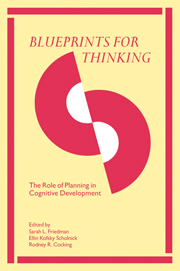Blueprints for Thinking
Planning is an important human ability that guides behaviour and thereby complements instinctual fixed action patterns. How do people learn to plan? How do they develop the various skills that are implied by planfulness? This volume explores these questions as well as the concept of planning and its relationships to the concepts of problem-solving and organizational skills. The editors of this volume have drawn upon an international cadre of scholars to discuss the issues of planning and planful behaviours from a broad range of perspectives. The volume offers a comprehensive review and critical analysis of research and theory on the development of planning ability. Cognitive and developmental psychologists, educational researchers, and students hitherto frustrated by the complexity of the thinking about planning and fragmentation of the literature will find Blueprints for Thinking an invaluable resource.
Product details
February 2008Paperback
9780521051750
576 pages
228 × 153 × 32 mm
0.862kg
Available
Table of Contents
- List of contributors
- Foreword Jerome Kagan
- Acknowledgements
- Part I. The Prevalence of Planning:
- 1. The planning construct in the psychological literature Ellin Kofsky Scholnick and Sarah L. Friedman
- 2. Planning in cross-cultural settings Robert A. Randall
- Part II. Models and Conceptions of Planning:
- 3. A cognitive-developmental model of planning Richard De Lisi
- 4. Plans and planning: their motivational and cognitive antecedents Shulamith Kreitler and Hans Kreitler
- 5. Social aspects of planning Jacqueline J. Goodnow
- Part III. Children's Skills of Planning:
- 6. Conceptions and processes of planning: the developmental perspective Shulamith Kreitler and Hans Kreitler
- 7. Planning in a chore-sheduling task Roy D. Pea and Jan Hawkins
- 8. Children's adjustment of plans to circumstances Barbara Rogoff, Mary Gauvain and William Gardner
- 9. Action planning competencies during adolescence and early adulthood Michael Dreher and Rolf Oerter
- 10. Cognitive and social variables in the plan of action Louis Oppenheimer
- Part IV. Influences on Planning:
- 11. Familial influences on planning Ann V. McGillicuddy-De Lisi, Richard De Lisi, Janice Flaugher and Irving E. Sigel
- 12. Social influences on representational awareness: plans for representing and plans as representation Rodney R. Cocking and Carol E. Copple
- Part V. Instruction of Planning:
- 13. Instruction in problem solving and planning Martin V. Covington
- Part VI. Conclusion:
- 14. Reflections on reflections: what planning is and how it develops Sarah L. Friedman, Ellin Kofsky Scholnick and Rodney R. Cocking
- Name index
- Subject index.






